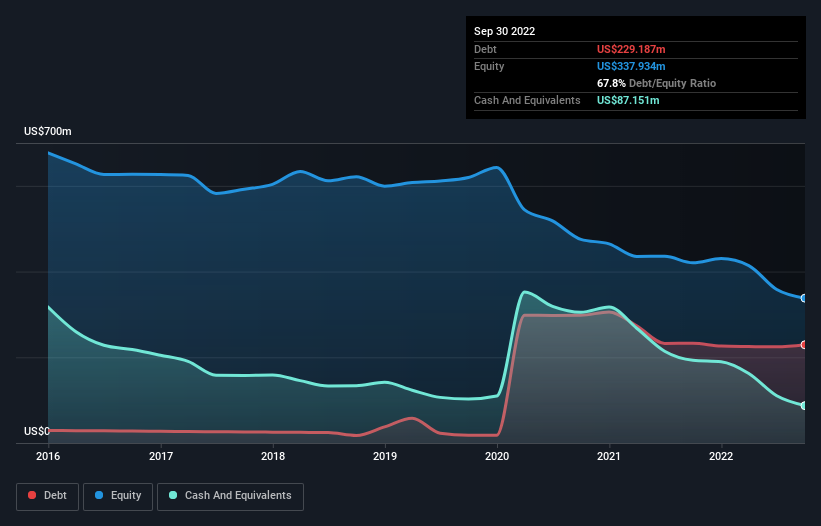
Legendary fund manager Li Lu (who Charlie Munger backed) once said, 'The biggest investment risk is not the volatility of prices, but whether you will suffer a permanent loss of capital.' So it might be obvious that you need to consider debt, when you think about how risky any given stock is, because too much debt can sink a company. We can see that IMAX Corporation (NYSE:IMAX) does use debt in its business. But is this debt a concern to shareholders?
When Is Debt A Problem?
Debt assists a business until the business has trouble paying it off, either with new capital or with free cash flow. In the worst case scenario, a company can go bankrupt if it cannot pay its creditors. However, a more usual (but still expensive) situation is where a company must dilute shareholders at a cheap share price simply to get debt under control. Of course, debt can be an important tool in businesses, particularly capital heavy businesses. The first step when considering a company's debt levels is to consider its cash and debt together.
Check out the opportunities and risks within the US Entertainment industry.
What Is IMAX's Debt?
As you can see below, IMAX had US$229.2m of debt, at September 2022, which is about the same as the year before. You can click the chart for greater detail. However, because it has a cash reserve of US$87.2m, its net debt is less, at about US$142.0m.

How Strong Is IMAX's Balance Sheet?
According to the last reported balance sheet, IMAX had liabilities of US$121.6m due within 12 months, and liabilities of US$340.7m due beyond 12 months. Offsetting this, it had US$87.2m in cash and US$224.7m in receivables that were due within 12 months. So its liabilities total US$150.5m more than the combination of its cash and short-term receivables.
Since publicly traded IMAX shares are worth a total of US$902.9m, it seems unlikely that this level of liabilities would be a major threat. Having said that, it's clear that we should continue to monitor its balance sheet, lest it change for the worse.
We measure a company's debt load relative to its earnings power by looking at its net debt divided by its earnings before interest, tax, depreciation, and amortization (EBITDA) and by calculating how easily its earnings before interest and tax (EBIT) cover its interest expense (interest cover). This way, we consider both the absolute quantum of the debt, as well as the interest rates paid on it.
IMAX has a debt to EBITDA ratio of 2.8 and its EBIT covered its interest expense 3.3 times. Taken together this implies that, while we wouldn't want to see debt levels rise, we think it can handle its current leverage. One redeeming factor for IMAX is that it turned last year's EBIT loss into a gain of US$14m, over the last twelve months. There's no doubt that we learn most about debt from the balance sheet. But it is future earnings, more than anything, that will determine IMAX's ability to maintain a healthy balance sheet going forward. So if you're focused on the future you can check out this free report showing analyst profit forecasts.
Finally, a business needs free cash flow to pay off debt; accounting profits just don't cut it. So it is important to check how much of its earnings before interest and tax (EBIT) converts to actual free cash flow. During the last year, IMAX burned a lot of cash. While that may be a result of expenditure for growth, it does make the debt far more risky.
Our View
We'd go so far as to say IMAX's conversion of EBIT to free cash flow was disappointing. But at least its level of total liabilities is not so bad. Once we consider all the factors above, together, it seems to us that IMAX's debt is making it a bit risky. That's not necessarily a bad thing, but we'd generally feel more comfortable with less leverage. Given our hesitation about the stock, it would be good to know if IMAX insiders have sold any shares recently. You click here to find out if insiders have sold recently.
If, after all that, you're more interested in a fast growing company with a rock-solid balance sheet, then check out our list of net cash growth stocks without delay.
New: AI Stock Screener & Alerts
Our new AI Stock Screener scans the market every day to uncover opportunities.
• Dividend Powerhouses (3%+ Yield)
• Undervalued Small Caps with Insider Buying
• High growth Tech and AI Companies
Or build your own from over 50 metrics.
Have feedback on this article? Concerned about the content? Get in touch with us directly. Alternatively, email editorial-team (at) simplywallst.com.
This article by Simply Wall St is general in nature. We provide commentary based on historical data and analyst forecasts only using an unbiased methodology and our articles are not intended to be financial advice. It does not constitute a recommendation to buy or sell any stock, and does not take account of your objectives, or your financial situation. We aim to bring you long-term focused analysis driven by fundamental data. Note that our analysis may not factor in the latest price-sensitive company announcements or qualitative material. Simply Wall St has no position in any stocks mentioned.
About NYSE:IMAX
IMAX
Operates as a technology platform for entertainment and events worldwide.
Proven track record with adequate balance sheet.
Similar Companies
Market Insights
Community Narratives




